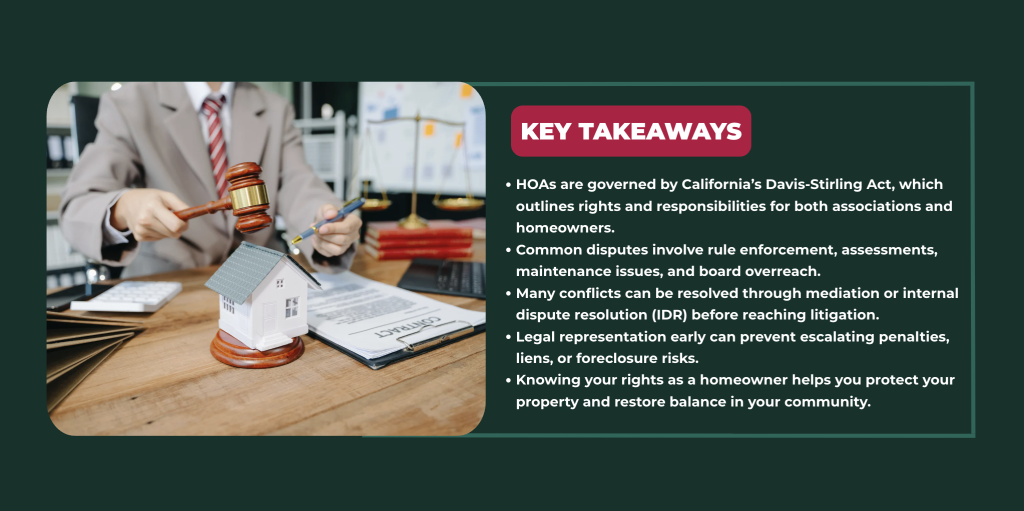Homeowners’ Associations (HOAs) are designed to preserve property values and maintain community standards, but when communication breaks down or rules are applied unfairly, what starts as a small disagreement can turn into a serious legal battle.
At ACE California Law, we understand that HOA conflicts are about more than dues or landscaping they’re about protecting your property, your rights, and your peace of mind. Our real estate attorneys help homeowners, board members, and investors resolve disputes efficiently while keeping costs and stress under control.

Understanding HOA Authority in California
Under the Davis-Stirling Common Interest Development Act (Civil Code §§4000–6150), HOAs have broad powers to:
- Enforce community rules (CC&Rs and bylaws)
- Collect assessments and dues
- Maintain common areas
- Impose fines and penalties for violations
While these powers are intended to protect the community, they can also be misused or misinterpreted — leading to unfair treatment or excessive fines. Homeowners have the right to due process, including written notice, a hearing opportunity, and access to association records.
Common HOA Disputes We See
1. Rule Enforcement and Fines
Disputes often arise over alleged violations of community rules, from exterior paint colors to parking restrictions. If an HOA fails to follow proper notice and hearing procedures, fines may be invalid.
2. Maintenance and Repairs
Associations are responsible for maintaining common areas like roofs, pools, and landscaping. When they fail to act, homeowners may face property damage and costly repairs. Legal action may compel the HOA to meet its obligations.
3. Assessment and Fee Disputes
Unexpected or excessive special assessments can create financial strain. HOAs must provide detailed budgets, meeting minutes, and justifications before raising fees.
4. Board Misconduct or Elections
Unfair board elections, conflicts of interest, or misuse of funds can undermine community trust. California law allows homeowners to inspect association records and challenge irregularities.
5. Architectural or Modification Denials
When homeowners apply to make improvements — such as solar panels or accessibility upgrades — HOAs must evaluate requests reasonably and within statutory timeframes. Unreasonable denials can be challenged.
Legal Remedies for HOA Disputes
Depending on the issue, homeowners may pursue several remedies:
- Internal Dispute Resolution (IDR): A mandatory good-faith meeting between the owner and HOA board.
- Mediation / Alternative Dispute Resolution (ADR): Required before filing most HOA lawsuits.
- Injunctions: Court orders compelling or restraining specific actions by the HOA.
- Monetary Damages: Recovery for property losses, excessive fines, or attorney fees.
California law also allows prevailing parties in HOA litigation to seek attorney’s fees — making it essential to document every step of the dispute process.
Protecting Yourself in HOA Conflicts
- Keep everything in writing: Save letters, notices, and emails from the HOA.
- Attend board meetings: Stay informed about proposed changes and assessments.
- Request records: Financial statements and meeting minutes must be available for inspection.
- Know your rights: The Davis-Stirling Act protects homeowners from unfair enforcement and improper penalties.
- Consult an attorney early: Legal guidance can stop conflicts from escalating to litigation.
When to Involve an Attorney
If your HOA threatens fines, liens, or foreclosure — or if you believe the board has overstepped its authority — it’s time to speak with counsel. A real estate attorney can:
- Evaluate whether the HOA followed required procedures
- Represent you in IDR or mediation
- Challenge unlawful assessments or fines
- File for injunctions or damages if necessary
Early action helps you maintain control and avoid costly, drawn-out disputes.
Resolve Conflict Without Losing Your Peace
HOA disputes don’t just affect your property they affect your daily life. Whether you’re dealing with unfair enforcement, unpaid repairs, or escalating assessments, ACE California Law can help you find a practical path forward.
Call ACE California Law at (833) 342-2323 or visit our Contact Us page to schedule a consultation.
Protect your property. Protect your peace of mind. Protect your future.






